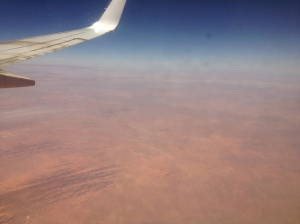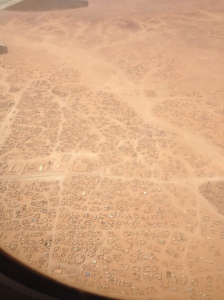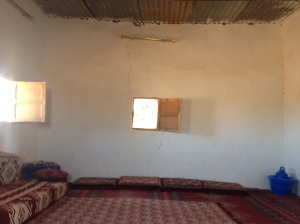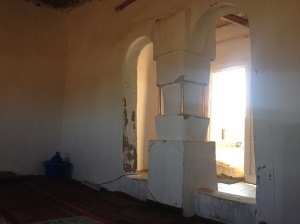
Thanks to the support of the FiSahara Film Festival and the Arab Studies Institute, I spent about a week in the Dakhla Sahrawi refugee camp, about 170 kilometers outside of Tindouf in southern Algeria. I went in my capacity as a freelance writer, graduate student, and activist. During my time there, I stayed with a Sahrawi refugee family and met a number of Sahrawi refugees, international filmmakers, journalists, and members of the Polisario and Sahrawi Arab Democratic Republic government.
Going into this trip, I carried with me a series of baggages that weren’t the kind you could measure on a scale. My privilege was the biggest baggage. As a Moroccan-American, I came from two countries who have being powerful actors in the Western Saharan conflict: Morocco, the country that invaded the Western Saharan territory in 1975, and the United States, the country that largely supplies the military and financial aid that allows Morocco to sustain its (violent) presence in the territory. The other baggage I carried with me was my ignorance. Having largely been informed of the conflict through the Moroccan side, I held severe misconceptions that colored my understanding of the conflict and the Sahrawi population in general. Among these misconceptions were that mobility within the refugee camps was severely restricted, that the area surrounding the camp was a hotbed of insecurity and violence, and that my presence in the camps as a Moroccan would trigger negative responses and reactions among the Sahrawi population. I also went into this trip with the overarching anxiety about what the consequences would be for me during my next visit to Morocco and the issues my family living in Morocco would face. Without even having visited the camps, members of my family and neighbors have already been subjected to unannounced visits from Moroccan intelligence services and their incessant questions about me and my work. While I have plenty to recount about the political atmosphere, the conditions under which Sahrawis live in the refugee camps, the role of the Polisario, the socioeconomic realities Sahrawis face, and questions of women’s rights and gender, among others–which I will discuss in forthcoming articles–this post, along with future posts on this blog are meant to focus on my personal experiences.

The first person I had a conversation with upon my arrival was Sahrawi singer and artists, Mariem Hassan. I had read about Mariem Hassan, who is currently battling cancer and living with her family in Spain. She arrived in the camps in the same plane I flew in from Madrid. As she shielded herself from the grueling midday sun in the shade, I introduced myself to her as a writer in darija. Initially guarded and reserved, she asked, “Where are you from, Algeria?” I said, “No, my family is from Morocco but I was born in the United States.” Her eyes lit, she embraced me, kissed my cheek, and held my arm: “Welcome, my sister. Moroccans are our brothers and sisters. You are welcome here.” We had a brief conversation, where I expressed my solidarity with Sahrawi self-determination and made plans to meet again once we arrived to the camps after the 6-hour bus ride from Tindouf. The drive to the camps, which involved several buses carrying the festival attendees and an armed military escort, lasted more than the estimated 4 hours. Less than a full hour into the bus ride, our Algerian escort made a halt at a military checkpoint, and the Polisario’s Sahrawi People’s Liberation Army accompanied the convoy for the duration of the drive. From that transition, no Algerian flags, soldiers, or officers were longer visible, even though we were still formally in Algerian territory. It was apparent that the Algerian government was offering the Sahrawi refugees more than just land as temporary “guests,” as Sahrawis put it, but the Algerian government gave the Polisario and SADR government complete control and administration over the camps and the refugees. At times, I would even forget I was still in Algerian territory.
Once we arrived to the camps, attendees were divided between Sahrawi families who hosted us for the duration of the festival in their homes. The mother of the family I stayed with helped me lug my bags through the sand to her home and found tea and dinner waiting for us, even though it was past midnight. Her 3 daughters, son, and nieces welcomed me and the conversation quickly turned political once I said I was a Moroccan-American. We discussed the February 20th Movement and the oppression they endured under the makhzen. “We saw the protests getting violently dispersed on tv,” they said. SADR state media tv, that is. Even with their hassaniya dialect and my darija, communication was relatively smooth aside from the few words that got lost on them and me. The family I stayed with had several elements to their home: a fixed, cement structure which housed the open sitting area, a tent that also served as a sitting area and had a television, two other cement structures where one included a kitchen and storage area and the other which served as the family’s private room, and an outhouse with the bathroom. A water reservoir was also located within the premise, where the family drew water from with a hose. Most of the families I visited in Dakhla had a similar design plan.


During the first day, I met Sahrawi refugees and members of the Polisario. I’m going to withhold their names for their own safety, as some of them also live in the territories controlled by Morocco. Conversations generally centered around the same theme: Sahrawis expressing their welcome of my visit and how they view Moroccans as their brothers and sisters. One conversation I had that differed was with a Sahrawi male whose face was covered and refused to shake my hand, saying “I refuse to engage with any Moroccans until the borders are open.” He refused to talk to me and shake my hand, and would walk away anytime I entered a space he was in. When other Sahrawis tried to tell him he was being unreasonable, he said he vowed to his father, who died in the war, that he would not speak to any Moroccans until the borders open. There’s no way of discussing this encounter without my privilege exuding. I kindly asked his brother to tell him that I completely respect him and his assertions, and will not challenge them. Two days later, I accompanied members of the organizing committee of the FiSahara film festival for a lunch hosted by a Sahrawi family in their home. As I sat outside looking beyond the camps, I turned to a young man, whose name I won’t mention, and asked if I could pose a question, which he kindly agreed. Pointing in front of us, I asked which cardinal direction it was. “South,” he said. We began having a discussion about geography and mobility beyond the camps, after which he made a funny remark and we jokingly slapped each other’s hands. “You’re the first Moroccan whose hands I shake.” I asked him if he was the same person who refused to talk to me two days ago, and he said yes and explained that this is his home I was having lunch in.
How does someone, coming from a country that has forced a population to live in refuge away from their land respond to such an encounter? How do you express your solidarity and support, which embodies the privilege of someone who will never experience the violence that is displacement and occupation? How do you put together the words in writing of a conversation between two people that is ridden with power imbalances? These are questions I will continue to consider in my forthcoming posts on my trip.
Dear Samia; Thank you so much for your nice narrative style writing
and your courage step toward understanding others.
We are still waiting for second part of your Hikayat in strange land